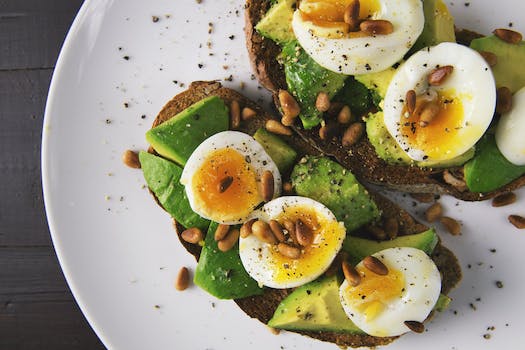
A healthy gluten-free diet is not just a passing fad; it is a crucial aspect of maintaining your overall well-being. Gluten, a protein found in grains like wheat, barley, and rye, can trigger adverse reactions in individuals with celiac disease or gluten sensitivity. This article explores the importance of adopting a gluten-free diet and how it can positively impact your health and quality of life.
- 1. Introduction
- 1.1. What is a gluten-free diet?
- 1.2. Benefits of a gluten-free diet
- 1.3. How to approach a gluten-free diet
- 1.4. Common misconceptions about gluten-free diets
- 1.5. Seeking professional advice before starting a gluten-free diet
- 2. Foods to Include in a Gluten-Free Diet
- 2.1. Naturally gluten-free grains
- 2.2. Fruits and vegetables
- 2.3. Lean proteins
- 2.4. Dairy and dairy alternatives
- 2.5. Healthy fats and oils
- 3. Foods to Avoid in a Gluten-Free Diet
1. Introduction
A healthy gluten-free diet is not just a trend but an essential aspect of maintaining overall well-being. With the increasing number of people diagnosed with gluten intolerance or celiac disease, it has become crucial to understand the importance of eliminating gluten from our diets. Gluten, a protein found in wheat, barley, and rye, can cause a range of health issues for individuals with gluten sensitivity. In this article, we will explore why adopting a gluten-free diet is necessary for your well-being and how it can positively impact your overall health.
1.1. What is a gluten-free diet?
A gluten-free diet is a dietary approach that excludes the protein gluten. Gluten is commonly found in grains such as wheat, barley, and rye. People with certain medical conditions, such as celiac disease, non-celiac gluten sensitivity, or wheat allergy, need to follow a gluten-free diet to maintain their health and well-being.
Gluten can cause severe reactions in individuals with celiac disease, an autoimmune disorder. When people with celiac disease consume gluten, their immune system attacks the small intestine, leading to damage and various symptoms. These symptoms can include digestive issues like bloating, diarrhea, and abdominal pain, as well as fatigue, skin rashes, and even neurological problems.
Non-celiac gluten sensitivity refers to individuals who experience similar symptoms to those with celiac disease but do not test positive for the condition. These individuals still benefit from following a gluten-free diet to alleviate their symptoms and improve their overall health.
Additionally, some people may have a wheat allergy, which can cause an allergic reaction when consuming gluten-containing grains. In such cases, a gluten-free diet is necessary to prevent adverse reactions.
Overall, a gluten-free diet is essential for the well-being of individuals with celiac disease, non-celiac gluten sensitivity, or a wheat allergy. By eliminating gluten from their diet, they can manage their symptoms, promote gut healing, and improve their overall quality of life.
1.2. Benefits of a gluten-free diet
A gluten-free diet has gained immense popularity in recent years, and for good reason. Not only is it essential for individuals with gluten-related disorders such as celiac disease, but it also offers numerous benefits for overall health and well-being. By eliminating gluten, a protein found in wheat, barley, and rye, from your diet, you can experience a wide range of positive effects on your body.
First and foremost, a gluten-free diet can help alleviate symptoms and improve the quality of life for those with celiac disease. This autoimmune disorder causes the body’s immune system to react negatively to gluten, resulting in damage to the small intestine. By avoiding gluten-containing foods, individuals with celiac disease can prevent further damage and allow their intestines to heal.
In addition to managing celiac disease, a gluten-free diet has been found to benefit individuals with non-celiac gluten sensitivity. Although not as severe as celiac disease, this condition can still cause uncomfortable symptoms such as bloating, abdominal pain, and fatigue. Eliminating gluten from the diet can help reduce these symptoms and improve overall digestive health.
Furthermore, many people without any diagnosed gluten-related disorders have adopted a gluten-free lifestyle due to the belief that it can enhance their overall well-being. Some individuals claim that a gluten-free diet can boost energy levels, improve mental clarity, and aid in weight loss. While scientific evidence supporting these claims is limited, many individuals report feeling healthier and more energetic after adopting a gluten-free eating pattern.
Moreover, a gluten-free diet often promotes the consumption of whole, unprocessed foods that are naturally gluten-free, such as fruits, vegetables, lean proteins, and whole grains like quinoa and rice. These nutrient-rich foods provide essential vitamins, minerals, and fiber, which can contribute to improved overall health.
In conclusion, a gluten-free diet offers various benefits, including symptom relief for individuals with celiac disease, improved digestive health for those with gluten sensitivity, and potential positive effects on overall well-being. Whether you have a gluten-related disorder or simply want to explore a gluten-free lifestyle, it is important to consult with a healthcare professional or registered dietitian to ensure a balanced and nutritious diet.
1.3. How to approach a gluten-free diet
A gluten-free diet is crucial for individuals with gluten-related disorders, such as celiac disease, gluten sensitivity, and wheat allergies. It involves avoiding the consumption of gluten, a protein found in wheat, barley, rye, and other grains. Following a gluten-free diet is not only necessary for managing these conditions but also essential for overall well-being. This article will guide you on how to approach a gluten-free diet and provide you with valuable information to maintain a healthy lifestyle while avoiding gluten.
1.4. Common misconceptions about gluten-free diets
The concept of gluten-free diets has gained considerable attention in recent years, with many people adopting this dietary approach for various reasons. However, there are several misconceptions surrounding gluten-free diets that need to be clarified. In this article, we will debunk some common misconceptions and shed light on why a healthy gluten-free diet is essential for your overall well-being.
1.5. Seeking professional advice before starting a gluten-free diet
Before starting a gluten-free diet, it is important to seek professional advice. Consulting with a healthcare professional or a registered dietitian can provide valuable guidance and ensure that the diet is suitable for your specific needs. They can assess your nutritional requirements, identify any potential deficiencies, and help create a well-balanced meal plan. Additionally, they can help you navigate through the challenges of eliminating gluten from your diet, such as finding suitable alternatives and avoiding cross-contamination. Seeking professional advice before embarking on a gluten-free diet is crucial to ensure that you maintain a healthy and balanced approach to your well-being.
2. Foods to Include in a Gluten-Free Diet
A gluten-free diet is not only essential for individuals with celiac disease or gluten intolerance but also for those who want to improve their overall well-being. By eliminating gluten, a protein found in wheat, barley, and rye, from your diet, you can experience various health benefits. To ensure a healthy gluten-free diet, it is important to include a variety of nutritious foods. Here are some foods that you should include in your gluten-free diet:
1. Fruits and Vegetables: These should form the foundation of your gluten-free diet. They are rich in vitamins, minerals, and antioxidants, which contribute to good health.
2. Whole Grains: While it is necessary to avoid wheat, barley, and rye, there are plenty of gluten-free whole grains available. These include quinoa, brown rice, millet, and oats (labeled as gluten-free).
3. Legumes: Beans, lentils, chickpeas, and other legumes are excellent sources of protein and fiber. They can be a great addition to your gluten-free diet.
4. Lean Proteins: Include lean meats, poultry, fish, and eggs in your gluten-free diet to meet your protein requirements.
5. Dairy or Dairy Alternatives: If you can tolerate dairy, include it in your gluten-free diet. Otherwise, opt for dairy alternatives like almond milk, coconut milk, or soy milk.
6. Nuts and Seeds: These are nutritious snacks that can provide healthy fats, protein, and fiber. Enjoy a handful of almonds, walnuts, chia seeds, or flaxseeds as part of your gluten-free diet.
7. Healthy Fats: Avocados, olive oil, coconut oil, and nuts are excellent sources of healthy fats. Including them in your gluten-free diet can support heart health.
Remember to always read food labels carefully to ensure that the products you choose are truly gluten-free. Incorporating a variety of these foods into your gluten-free diet can help you maintain a well-rounded and nutritious eating plan for your overall well-being.
2.1. Naturally gluten-free grains
A gluten-free diet is essential for individuals with celiac disease or gluten sensitivity. Luckily, there are numerous naturally gluten-free grains that can be included in a gluten-free diet. These grains are not only safe to consume for those with gluten-related disorders but also provide essential nutrients and delicious flavors.
One such grain is rice, which is a staple food for many cultures around the world. Whether it’s long-grain white rice, short-grain brown rice, or fragrant jasmine rice, all varieties are naturally gluten-free and can be enjoyed as a side dish or as a main ingredient in various dishes.
Another versatile gluten-free grain is quinoa. It is highly nutritious and packed with protein, fiber, and various vitamins and minerals. Quinoa can be used as a substitute for rice, added to salads, or even used in baking.
Buckwheat is yet another gluten-free grain that is commonly used in cooking. Despite its name, buckwheat is not a type of wheat and is naturally gluten-free. It can be ground into flour to make pancakes, noodles, or used as a base for porridge.
One more gluten-free grain worth mentioning is corn. Corn is widely consumed and can be found in various forms such as cornmeal, corn flour, or cornstarch. It can be used to make tortillas, cornbread, or added to soups and stews.
Including these naturally gluten-free grains in your diet can add variety, nutrition, and deliciousness to your meals while ensuring that you maintain a healthy gluten-free lifestyle.
2.2. Fruits and vegetables
Fruits and vegetables are an essential part of a gluten-free diet. They are not only delicious but also packed with nutrients that are beneficial for your well-being. Whether you are following a gluten-free diet due to a medical condition or simply as a lifestyle choice, incorporating a variety of fruits and vegetables into your meals is crucial.
Fruits such as berries, apples, oranges, and bananas are great choices as they are naturally gluten-free. They provide a good source of vitamins, minerals, and fiber. Vegetables like spinach, broccoli, carrots, and bell peppers are also excellent additions to a gluten-free diet. They are rich in antioxidants and provide essential nutrients for overall health.
Including a wide range of fruits and vegetables in your gluten-free diet can help ensure that you receive a diverse array of nutrients. These foods also add color, flavor, and texture to your meals, making them more enjoyable and satisfying.
Remember to always wash your fruits and vegetables thoroughly before consumption. Additionally, aim for at least five servings of fruits and vegetables per day to maximize their health benefits. By incorporating these natural, gluten-free foods into your diet, you can promote your overall well-being and maintain a healthy lifestyle.
2.3. Lean proteins
When following a gluten-free diet, it is important to include lean proteins in your meals. Lean proteins are an essential component for maintaining a healthy and balanced diet. They provide necessary nutrients and help build and repair tissues in the body.
Including lean proteins in a gluten-free diet can help ensure that you are getting enough protein while avoiding gluten-containing foods. Some excellent sources of lean proteins that are gluten-free include:
1. Chicken: Skinless chicken breasts are a great choice as they are low in fat and high in protein. They can be grilled, baked, or sautéed for a delicious and healthy meal.
2. Fish: Fish such as salmon, tuna, and trout are not only gluten-free but also rich in omega-3 fatty acids, which are beneficial for heart health. Grilling or baking fish can help retain its nutrients.
3. Eggs: Eggs are a versatile and cost-effective source of lean protein. They can be scrambled, boiled, or used in various dishes such as omelets and salads.
4. Legumes: Beans, lentils, and chickpeas are excellent plant-based sources of protein. They are also high in fiber, which aids in digestion. These can be included in soups, stews, or salads.
5. Greek Yogurt: Greek yogurt is a protein-packed option that is also low in carbohydrates. It can be enjoyed as a snack or used as a base for smoothies or dressings.
Including these lean proteins in your gluten-free diet can help ensure that you are meeting your nutritional needs while enjoying a variety of delicious and healthy meals.
2.4. Dairy and dairy alternatives
Dairy and dairy alternatives are important components to consider when following a gluten-free diet. While some individuals with gluten intolerance or celiac disease may also have lactose intolerance, many can still enjoy dairy products or find suitable alternatives.
Dairy products such as milk, cheese, and yogurt are excellent sources of calcium, protein, and other essential nutrients. However, it’s crucial to ensure that these products are gluten-free as some processed dairy items may contain hidden gluten.
For those who cannot consume dairy or choose to avoid it, there are plenty of dairy alternatives available. Almond milk, soy milk, coconut milk, and rice milk are popular substitutes. These alternatives are fortified with calcium and often come in various flavors.
It’s always important to read labels carefully and choose products that are specifically labeled as gluten-free. Additionally, consulting with a healthcare professional or registered dietitian can help determine the best dairy or dairy alternative options for individual dietary needs during a gluten-free lifestyle.
2.5. Healthy fats and oils
Including healthy fats and oils in a gluten-free diet is crucial for maintaining overall well-being. While it may seem counterintuitive, consuming fats in moderation can have numerous health benefits. These healthy fats provide essential nutrients and support various bodily functions.
One of the best sources of healthy fats for individuals following a gluten-free diet is avocados. Avocados are rich in monounsaturated fats, which can help lower bad cholesterol levels and reduce the risk of heart disease. They are also packed with vitamins and minerals, including vitamin E, potassium, and folate.
Another excellent option is olive oil. Olive oil is known for its high content of monounsaturated fats and antioxidants, which can promote heart health and reduce inflammation in the body. It is a versatile oil that can be used for cooking or as a dressing for salads.
Coconut oil is another healthy fat that can be incorporated into a gluten-free diet. It contains medium-chain triglycerides (MCTs), which are easily digestible and can provide a quick source of energy. Coconut oil has also been associated with various health benefits, including improved brain function and weight management.
In addition to these, nuts and seeds are excellent sources of healthy fats for those following a gluten-free diet. Almonds, walnuts, chia seeds, and flaxseeds are all packed with omega-3 fatty acids, which are essential for brain health and reducing inflammation.
Including these healthy fats and oils in your gluten-free diet can help improve overall well-being and support a healthy lifestyle. It’s important to remember to consume them in moderation as part of a balanced diet.
3. Foods to Avoid in a Gluten-Free Diet
When following a gluten-free diet, it is important to be aware of certain foods that should be avoided. These foods contain gluten, a protein found in wheat, barley, and rye. Here are some common foods to avoid:
1. Wheat-based products: This includes bread, pasta, cereal, and baked goods made with wheat flour.
2. Barley and rye: These grains also contain gluten and are commonly found in bread, beer, and certain cereals.
3. Processed foods: Many processed foods, such as canned soups, sauces, and snacks, may contain hidden gluten in the form of additives or thickeners.
4. Sauces and condiments: Some sauces and condiments, like soy sauce, salad dressings, and marinades, often contain gluten.
5. Gluten-containing grains: Apart from wheat, barley, and rye, other gluten-containing grains like spelt, kamut, and triticale should be avoided.
6. Fried foods: Foods that are breaded or coated in flour before frying, such as fried chicken or tempura, usually contain gluten.
7. Processed meats: Certain processed meats, like sausages, deli meats, and hot dogs, may contain gluten as fillers or binders.
It is essential to carefully read food labels and choose gluten-free alternatives to these foods in order to maintain a healthy gluten-free diet and ensure overall well-being.
3.1. Wheat and wheat-based products
Wheat and wheat-based products are a crucial component to avoid in a gluten-free diet. Wheat contains a protein called gluten, which can trigger adverse reactions in individuals with gluten sensitivity or celiac disease. Common wheat-based products include bread, pasta, crackers, cereals, and baked goods. These items often serve as staples in many people’s diets, but for those following a gluten-free lifestyle, they need to be eliminated or substituted with gluten-free alternatives. It’s important to carefully read food labels and look for gluten-free certifications to ensure that wheat or wheat derivatives are not present in the ingredients. Being mindful of wheat and its derivatives is essential for maintaining a healthy gluten-free diet and promoting overall well-being.
3.2. Barley and rye
Barley and rye are two grains that should be avoided in a gluten-free diet. These grains contain gluten, a protein found in wheat, barley, and rye, which can cause digestive issues and other health problems for individuals with gluten intolerance or celiac disease. Gluten is known to damage the lining of the small intestine in people with celiac disease, leading to nutrient deficiencies and various symptoms such as bloating, diarrhea, and fatigue.
Barley is commonly found in products like beer, malt, and barley-based cereals. Rye is often used in bread, rye whiskey, and certain types of beer. It’s important to read food labels carefully, as barley and rye can be hidden ingredients in many processed foods.
Fortunately, there are plenty of gluten-free alternatives available for those following a gluten-free diet. These include grains like rice, quinoa, corn, and gluten-free oats. It’s also possible to find gluten-free versions of bread, pasta, and other wheat-based products in most grocery stores or specialty health food stores.
By avoiding barley and rye and opting for gluten-free alternatives, individuals can maintain a healthy gluten-free diet and improve their overall well-being.
3.3. Processed foods containing gluten
Processed foods containing gluten are a major concern for individuals following a gluten-free diet. Gluten is a protein found in grains such as wheat, barley, and rye. It is commonly used as a binding agent in processed foods to improve texture and provide elasticity. However, for those with gluten sensitivity or celiac disease, consuming gluten can lead to various health issues.
Many processed foods contain hidden sources of gluten, making it necessary for individuals on a gluten-free diet to be vigilant when reading food labels. Some common processed foods that often contain gluten include bread, pasta, cereals, baked goods, sauces, dressings, and processed meats.
Even foods that may not seem obvious, such as soy sauce or certain types of seasoning blends, can contain gluten. It is important to carefully examine ingredient lists and look for any gluten-derived ingredients or potential cross-contamination.
To ensure a gluten-free diet, it is essential to opt for whole, unprocessed foods whenever possible. This includes fresh fruits and vegetables, lean meats, fish, poultry, dairy products, and gluten-free grains like quinoa or rice. By avoiding processed foods containing gluten, individuals can maintain a healthy gluten-free diet and improve their overall well-being.
3.5. Cross-contamination risks
Cross-contamination can pose significant risks for individuals following a gluten-free diet. It is crucial to be aware of the foods that should be avoided to maintain a healthy gluten-free lifestyle. Even a small amount of gluten can cause adverse effects on those with gluten sensitivity or celiac disease. To minimize the risk of cross-contamination, it is important to understand the potential sources of gluten and take necessary precautions to prevent any accidental ingestion. By being vigilant and knowledgeable about these risks, individuals can ensure their well-being while adhering to a gluten-free diet.


